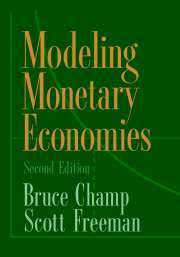Book contents
6 - Capital
from Part II - Banking
Summary
SO FAR, INDIVIDUALS in our model have had only one way to acquire consumption at a later time – by holding fiat money. In the real world, however, there are many other assets. In this chapter, we concentrate on one particular alternative asset, capital. We focus on capital here and in later chapters because capital produces goods and thus affects an economy's output. Nevertheless, our basic conclusions are applicable to other assets. We will see how the presence of an alternative asset affects people's willingness to hold fiat money. We begin by looking at the simplest model of capital.
Capital
Consider the following production technology: if kt units of the consumption good are converted into capital goods at time t, at time t + 1 you will receive xkt consumption goods, where x is some positive constant. This implies that the gross real rate of return on capital is x. We will assume that the capital goods produce only once before disintegrating (the depreciation rate is 100 percent).
As in previous models, individuals in the single-country economy are endowed with y units of the consumption good when young and zero units when old. Population grows at the gross rate n. Each member of the initial old begins with a stock of capital that produces xk0 goods in the first period.
Let us first analyze an equilibrium without fiat money. The capital technology enables the young to use some of today's consumption good to produce the consumption good at a later date. When young, individuals can convert part of their endowment into capital and consume the rest.
- Type
- Chapter
- Information
- Modeling Monetary Economies , pp. 117 - 137Publisher: Cambridge University PressPrint publication year: 2001



